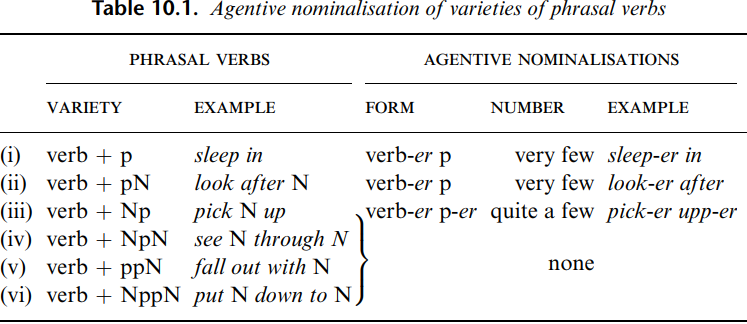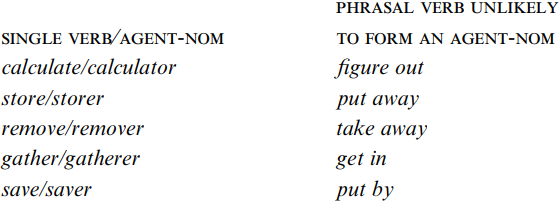


 Grammar
Grammar
 Tenses
Tenses
 Present
Present
 Past
Past
 Future
Future
 Parts Of Speech
Parts Of Speech
 Nouns
Nouns
 Verbs
Verbs
 Adverbs
Adverbs
 Adjectives
Adjectives
 Pronouns
Pronouns
 Pre Position
Pre Position
 Preposition by function
Preposition by function 
 Preposition by construction
Preposition by construction
 Conjunctions
Conjunctions
 Interjections
Interjections
 Grammar Rules
Grammar Rules
 Linguistics
Linguistics
 Semantics
Semantics
 Pragmatics
Pragmatics
 Reading Comprehension
Reading Comprehension|
Read More
Date: 2023-03-08
Date: 16-2-2022
Date: 2023-04-04
|
The possibilities for agentive nominalization, with examples, are summarized in Table 10.1, using ‘p’ for preposition and ‘N’ for a noun phrase or functionally equivalent constituent.

I have not been able to find any Agent-nom’s based on phrasal verbs of varieties (iv–vi). (However, there is a suffix -able, which forms adjectives from verbs. While discussing how a rather difficult student, S, had fallen out with his adviser, A, I indicated that in my opinion it was S’s fault by saying that A was not really very fall-able out-able with. Here, an adjective is derived from a type (v) phrasal verb, fall out with N, by adding -able to both fall and out. It may be that a more prolonged search would uncover occasional nominalizations based on variety (v) phrasal verbs.)
We can now discuss varieties (i–iii).
Variety (i). Most phrasal verbs of this type are not amenable to nominalization with -er. Just a few are, for example: looker on, sleeper in, and possibly chopper about. Note that -er just goes onto the verb.
Most phrasal verbs (made up of two Germanic elements) have a single-word synonym or semi-synonym (often a Romance verb), and it is this which forms an Agent-nom. Compare:

Variety (ii). Looker after is a rare instance of an Agent-nom:

As with variety (i), the -er goes just on the verb. There are again one-word synonyms or semi-synonyms (often Romance verbs) which form Agent-nom’s. For example:

Variety (iii). There are several hundred phrasal verbs with structure ‘verb plus N p’ (with the N being moveable to the position after the p if it is not a pronoun). Quite a few of them (although only a minority overall) do form an Agent-nom, indicating a habitual, volitional agent. For example:

Note that the agentive suffix -er generally goes onto both verb and preposition. Other examples include:

As with varieties (i) and (ii), there is often a single word (often of Romance origin) as synonym or semi-synonym, and an Agent-nom is more likely to be formed on this than on the phrasal verb (although, in the right context, it may be possible to place -er on the elements of the phrasal verb). For example:

Whether or not Agentive nominalization -er may go onto a phrasal verb of variety (iii)—which attaches -er to both verb and preposition—appears to depend in part on the identity of the preposition. Prepositions which accept -er most readily are up, out and off—these are in fact the most commonly occurring prepositions in phrasal verbs. Others are down, in and on, which are the next most common prepositional components; for example, runner downer (of someone’s reputation), filler inner (of forms), taker onner (of challenges). (Over and back are somewhat marginal.) It seems rather unlikely that -er could ever be added to about, across, away, by or round, all of which do occur in phrasal verbs of variety (iii). That is, one would not normally say *bring-er about-er, *gett-er across-er, *putt-er away-er, *putt-er by-er or *hav-er round-er.
In summary, -er may go onto just the verb of a phrasal verb of variety (i)—verb plus p—or (ii)—verb plus p N—or onto both verb and preposition for variety (iii)—verb plus N p. No example is attested of it just going at the end of the phrasal verb, on the preposition (we do not get, for example, *sleep-in-er, *look-after-er or *pick-upp-er).
|
|
|
|
5 علامات تحذيرية قد تدل على "مشكل خطير" في الكبد
|
|
|
|
|
|
|
تستخدم لأول مرة... مستشفى الإمام زين العابدين (ع) التابع للعتبة الحسينية يعتمد تقنيات حديثة في تثبيت الكسور المعقدة
|
|
|